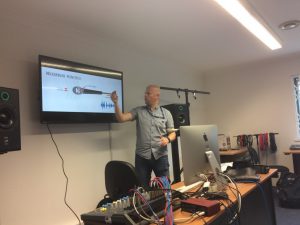September 6, 2018, by Matt Davies
DAHSS 2018 Part 2, Report: Digital Arts and Humanities Summer School 2018 by Odila Schroeder
The DAHSS 2018 convened in Nottingham the last week of June 2018 – it brought together PhD students from the East Midlands, and the South, West and Wales DTP for a fun-filled week of immersion into the Digital Arts and Humanities. For all those who were not able to attend, I have compiled some notes on each session below, including links to important resources, and some thoughts on how you could use the DHC (soon to be Faculty of Arts Digital Transformations Hub – DTH for short!) equipment to recreate our experience.
The session most were excited about, irrespective of their research projects, was “Film”. Led by Newcastle-based community filmmaker Danielle Giddins (@daniellegiddins), each group shot and edited a short documentary. After familiarizing us with a range of equipment, the absolute basics of terminology, and the do’s and don’ts of shooting techniques, we headed out for 30 minutes to get some footage. We quickly found that even the least-professional equipment (a go-pro or phone attached to a gimbal) would be sufficient for most purposes. Afterwards, we used DaVinciResolve, a free, but industry-standard software, to edit our short films. UoN Arts students are able to borrow professional standard digital cameras and tripods from the DTH and then edit video footage at the hub (which has software including Premier Pro and Camtasia) to make short videos for presentations, academic outreach, to promote our research or simply shoot interviews!
Similarly hands-on was our Audio-session with Ken Liston from the Confetti Institute of Creative Technologies at Nottingham Trent University (his colleague James Bentley also taught one group). We used equipment available in the Digital Composition Studio at the Music Department, but also learned about different recording devices and microphones you can use at home and on field trips. Again, the DTH has similar equipment available for UoN Arts students, so instead of preparing a PowerPoint presentation for your next presentation, why not produce a short podcast? Within a few hours, you can familiarize yourself with audacity, a decent and very intuitive editing software (also available at the DTH!), record yourself and edit it into a short but concise presentation. You can even make yourself sound more mature! Some groups presented their films and podcasts at the wrap-up session to much applause – you can find them on twitter.
Alexa Spors from UoN led our session on Websites and Web-design. First, they encouraged us to reflect on our own purposes: “What motivates you? What is exciting, different or unique about your work? Why should people look at your work and how are people feeling after looking at your online space?” Having tackled these identity-crisis inducing questions, we learned how we might represent ourselves visually online. Alexa also gave a coding-crash course and introduced us to a wealth of resources and tools for web-hosting and design. You can find all the resources on their dahss2018 website.
“Digital Archives and Exhibitions” brought together Stefania Zardini Lacedelli, from the University of Leicester, as well as Dr. Jo Robinson and DTH director Erin Snyder from the UoN. All participants had been looking through a variety of digital archives and exhibitions in preparation for the workshop, and we discussed some of the different formats during our session: from university and cultural heritage archives to exhibitions featured on the Google Arts and Culture Platform, collaborative exhibitions, crowdsourced archives and soundmaps, to personalized exhibition spaces. We soon started to build our own digital exhibition with Omeka. For everyone, who is collecting images, recordings, newspaper clippings, or manuscripts and would like to make their research more accessible, Omeka offers a space to curate digital exhibitions.
The session on “Databases” was also taught by Erin Snyder. Erin introduced us to the basics of database-design and explained how relational databases work and why they are such a powerful tool. We quickly set out to alter a few data points in the Dama International Deer Bone Database in Microsoft Access (which runs on every university computer!) and ventured into some more advanced SQL operations toward the end of the course. Erin regularly teaches this course as part of the Graduate School’s Short Courses, so make sure to book a place next year!
The session that unexpectedly left me with a deep impression of Nottingham’s wealth of resources was “Digital Manuscripts”, which took place at the University’s Manuscripts and Special Collections on the Kings Meadows Campus. Mark Bentley showed us around the huge and fascinating space that holds UoN’s special collections. Ironically, talking about digitization, this visit highlighted the importance of materiality and the impression a physical object and space can make on you. Mark then showed us the intricacies of digitizing a manuscript: the importance of reproducing authentic colours, keeping track of measurements, the use of the camera-equipment, and how to handle these ancient objects with care. Make sure to check out upcoming exhibitions at the Weston Gallery and the digital collections online!
Follow the DAHSS on twitter to connect with us and to learn about upcoming events!
No comments yet, fill out a comment to be the first


Leave a Reply